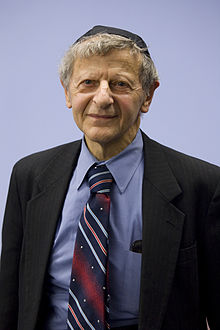I took time out last night to follow up a comment left on Vridar and listen to Derek Lambert’s MythVision interview with Tim O’Neill, author of the blog History for Atheists. If one sets aside the revealing psychological portrait that emerges from the incidental comments O’Neill lets drop about himself throughout the interview and focuses on his message one finds an unfortunate mix of contradictions, logical fallacies and factual errors presented with a confidence that evidently many readers find persuasive. I will attempt to deal with just one or two points per post to illustrate why readers and viewers need to put on their critical hats and examine carefully some of O’Neill’s claims.

In this post we look at what O’Neill has to say about the late Josephan specialist Louis Feldman, who came to reject the authenticity of any part of the Testimonium Flavianum (the passage about Jesus in Book 18 of Josephus’s Antiquities), and in particular at what O’Neill has to say about Feldman’s claim that a second century passage in a Dialogue with Trypho points to some debate at the time about the existence of Jesus.
Here is the Trypho passage.
But Christ—if he has indeed been born, and exists anywhere—is unknown, and does not even know himself, and has no power until Elias come to anoint him, and make him manifest to all. And you, having accepted a groundless report, invent a Christ for yourselves . . .
Justin’s Dialogue (ch.8)
Mythicist Earl Doherty acknowledged the passage’s ambiguity:
As I discuss at length in Appendix 12 of Jesus: Neither God Nor Man, the typical historicist argument over this passage is that Trypho “is arguing that Christians invented a false conception of Christ and applied it to Jesus” (so Eddy and Boyd in The Jesus Legend, p.170). But the language is far from this specific. And it is not Trypho who is assuming Jesus existed, but Justin, who is creating the dialogue and putting into Trypho’s mouth what he himself believes and to further the argument he is constructing.
But it does suggest that Justin is countering something that contemporary Jews are claiming, and the quotation is sufficiently ambiguous to suggest even to a committed historicist scholar like Robert Van Voorst (Jesus Outside the New Testament, p.15, n.35) that “This may be a faint statement of a non-existence hypothesis, but it is not developed . . . ” (It is not developed because that is not part of Justin’s purpose.) The “groundless report” may allude to an accusation that the entire Gospel story with its central character was indeed fiction.
(Doherty, on Vridar)
But O’Neill does not allow for any reasonable ambiguity and suggests that Feldman has fallen victim to senility for disputing the common interpretation of the passage.
The Intolerability of Ambiguity?
About 20 minutes in O’Neill professes adherence to the truism of the need to be tolerant of ambiguity in the evidence. The claim is made that “mythicism” appeals to people with a certain type of psychology, to those “who don’t like ambiguity”, who “want absolutes”, who “shun ambiguity and shades of grey”. About an hour in, he repeats “I am used to ambiguity”, to evidence that can be “read in different ways”, and that certain others “find ambiguity really weird”.
The sentiment is laudable. But when discussing a particular point of evidence that is clearly ambiguous O’Neill (around the 46-47 minute mark) unfortunately dismisses as blatantly wrong, as “a bad misreading, quite a remarkable, actually, misreading”, the interpretation that draws attention to its ambiguity.
Worse is the ad hominem: O’Neill goes so far as to suggest that the interpreter’s judgment was evidence of senility:
The problem with Feldman switching sides late in his life is … to be honest, I don’t think he was firing on all cylinders, he was in his eighties at that point, and also I think that his premise [is] on the misreading of a text.
Towards the end of the interview O’Neill declares that he believes in the importance of “reading books” and becoming familiar with “critical scholarship”. Again, a laudable sentiment. But had he done so in the case of Feldman’s claim about Trypho he would have known that Feldman did not somehow come to “remarkably misread” the text of Justin’s Dialogue with Trypho “late in his life” but had published the exact same point twenty years earlier.
When O’Neill refers to Paget’s criticism of Feldman’s “misreading” of Trypho, all he is doing is pointing to a blunt single sentence that says, without any argument or justification, that Feldman has “misread” the passage:
Feldman’s attempt to argue that Justin, Dial. 8 witnesses to such an argument is a misreading of the passage.
(Paget, 602)
No argument. Just a bald assertion that Feldman is wrong.
Here is what Feldman wrote, the argument he penned (when in his 80s) about the passage: Continue reading “Bad History for Atheists (1) — Louis Feldman on Justin’s Trypho and “proving Jesus existed””
